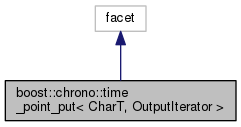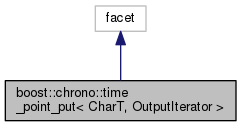|
| | time_point_put (size_t refs=0) |
| | Construct a time_point_put facet. More...
|
| |
| template<class Clock , class Duration > |
| iter_type | put (iter_type i, std::ios_base &ios, char_type fill, time_point< Clock, Duration > const &tp, const CharT *pattern, const CharT *pat_end) const |
| |
| template<class Clock , class Duration > |
| iter_type | put (time_point_units< CharT > const &units_facet, iter_type s, std::ios_base &ios, char_type fill, time_point< Clock, Duration > const &tp, const CharT *pattern, const CharT *pat_end) const |
| |
| template<class Clock , class Duration > |
| iter_type | put (iter_type i, std::ios_base &ios, char_type fill, time_point< Clock, Duration > const &tp) const |
| |
| template<typename Rep , typename Period > |
| iter_type | put_duration (iter_type i, std::ios_base &ios, char_type fill, duration< Rep, Period > const &d) const |
| |
| template<typename Clock > |
| iter_type | put_epoch (iter_type i, std::ios_base &os) const |
| |
| template<typename Clock > |
| iter_type | put_epoch (time_point_units< CharT > const &facet, iter_type s, std::ios_base &) const |
| |
| | ~time_point_put () |
| | Destroy the facet More...
|
| |
template<class CharT, class OutputIterator = std::ostreambuf_iterator<CharT>>
class boost::chrono::time_point_put< CharT, OutputIterator >
- Template Parameters
-
| ChatT | a character type |
| OutputIterator | a model of OutputIterator |
The time_point_put facet provides facilities for formatted output of time_point values. The member function of time_point_put take a time_point and format it into character string representation.
template<class CharT , class OutputIterator = std::ostreambuf_iterator<CharT>>
template<class Clock , class Duration >
- Parameters
-
| i | an output stream iterator |
| ios | a reference to a ios_base |
| fill | the character used as filler |
| tp | the time_point |
| pattern | begin of the formatting pattern |
| pat_end | end of the formatting pattern |
Steps through the sequence from pattern to pat_end, identifying characters that are part of a pattern sequence. Each character that is not part of a pattern sequence is written to s immediately, and each pattern sequence, as it is identified, results in a call to put_duration or put_epoch; thus, pattern elements and other characters are interleaved in the output in the order in which they appear in the pattern. Pattern sequences are identified by converting each character c to a char value as if by ct.narrow(c,0), where ct is a reference to ctype<charT> obtained from ios.getloc(). The first character of each sequence is equal to '', followed by a pattern specifier character spec, which can be 'd' for the duration value or 'e' for the epoch. For each valid pattern sequence identified, calls put_duration(s, ios, fill, tp.time_since_epoch()) or put_epoch(s, ios).
An iterator pointing immediately after the last character produced.
Referenced by boost::chrono::operator<<(), and boost::chrono::time_point_put< CharT, OutputIterator >::put().
template<class CharT , class OutputIterator = std::ostreambuf_iterator<CharT>>
template<class Clock , class Duration >

